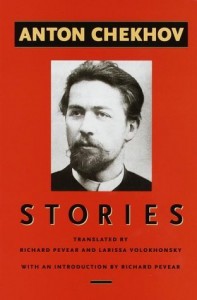 Chekhov names the nature of Olenka’s character early in the story in the following passage: “She was always fond of some one [sic], and could not exist without loving.” He then mentions some of the family members she has loved. But prior to this, her husband, Ivan Petrovitch Kukin, (aka Vanitchka) has had a large blowup about the vulgarity of the patrons of the story. I was drawn into the drama of Kukin and didn’t see this first clue, the subtle unfurling of Olenka’s personality. When she first parrots his opinion, “‘But do you suppose the public understands that?’” I thought we were seeing an action she would habitually take, but I didn’t yet realize this was the key to her nature. It isn’t until Chekhov revealed that the actors referred to her as “Vanitchka and I” that I got the point.
Chekhov names the nature of Olenka’s character early in the story in the following passage: “She was always fond of some one [sic], and could not exist without loving.” He then mentions some of the family members she has loved. But prior to this, her husband, Ivan Petrovitch Kukin, (aka Vanitchka) has had a large blowup about the vulgarity of the patrons of the story. I was drawn into the drama of Kukin and didn’t see this first clue, the subtle unfurling of Olenka’s personality. When she first parrots his opinion, “‘But do you suppose the public understands that?’” I thought we were seeing an action she would habitually take, but I didn’t yet realize this was the key to her nature. It isn’t until Chekhov revealed that the actors referred to her as “Vanitchka and I” that I got the point.
All of the details of the story point to the revelation about Olenka that she becomes a mirror of the one she loves; and Chekhov says it plainly several times. But because he says it plainly and also demonstrates through the action of the characters (I would argue that he never goes into full-blown scenes), the reader is enveloped by Olenka and her nature, rather than being assaulted from one direction. If, for example, Chekhov had simply told the reader over and over what Olenka was like, it would have felt hollow. If he had shown us her nature through action only, we might not have gotten the point. It is precisely this marriage of exposition and explanation that makes the story so rich. And because his explanatory sentences are so simple and direct, they don’t feel like an assault to the reader’s understanding of the story. They feel like an insight not a direction.
Regarding Olenka’s second husband, Chekhov shows her consumed by his lumber business as she “dreamed of perfect mountains of planks and boards, and long strings of wagons, carting timber far away.” He then goes on the say, “Her husband’s ideas were hers.” The entire story is woven with the warp of exposition and the weft of explanation. When Olenka is alone and she fails to muster opinions, Chekhov gives a beautiful description of her wasting away. He also tells us, “she had no opinions of any sort.”
When she begins caring for the veterinarian’s son, Chekhov writes, “Now she had opinions of her own.” What is interesting is the opinions are still not on matters that pertain to her daily life, but rather to the boy’s schooling. Her devotion continues, even when the object is less willing.
It is a short story, eleven pages in the collection I read, but it is a full story. Because Chekhov focuses on this one aspect of Olenka’s character and because he approaches it from more than one angle, the reader is enveloped in a world that is all about Olenka’s assumption of her loved ones’ worries and opinions.
I often worry that I am over-explaining things, but this story showed me that it is possible to go into minute detail about something as long as it is fully explored and done through more than one method. Olenka’s nature was evidently important to express, Chekhov based an entire story on it. It will be important for me to selective about the things I highlight in this way (although I can choose to highlight more because I am working on a novel and not a short story), but if I don’t explain them and expose them, they may not be in the story in the way I want them to. Storytelling is seduction.
A note on the [sic]: obviously I am reading a work in translation, but the use of “some one” versus “someone” more than once in the story made me want to know if this would be as peculiar in Russian or if the translation was somewhat outdated. I couldn’t help but think that the translator was trying to convey the nuance of Chekhov’s phraseology by stressing the individual “one.” Of course, I have no evidence either direction, but it certainly enhanced my understanding of the story.
If this review made you want to read the book, pick up a copy of Chekhov’s Short Stories from Bookshop.org. Your purchase keeps indie booksellers in business and I receive a commission.